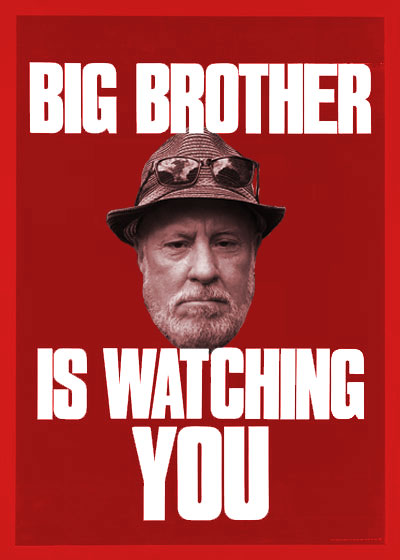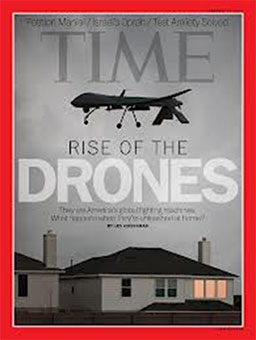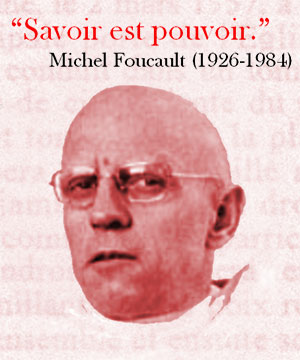Big Brother
"Big Brother is watching you."
George Orwell, 1984

You can't really begin a discussion of surveillance in the modern Western world without acknowledging George Orwell's 1984. That 1949 novel took place in (what was at the time) the near-future. In Orwell's vision of things to come, a totalitarian regime maintains complete control over the population by constantly watching the citizens through omnipresent "telescreens," monitors with attached video cameras, observing and recording everything everyone does. Big Brother is the name of the mysterious founder and leader of "the Party," whose face appears on telescreens across the nation of Oceania to remind citizens that "Big Brother is always watching you." It is unclear whether Big Brother is supposed to be a real person; he is described as "the embodiment of the Party" and has come to personify the power of surveillance in pop culture references today.
At the time that Orwell was writing, this kind of surveillance technology was still somewhat far-fetched. But now, 75 years after the book was written, the technology sounds more conventional than outlandish. In England, for example, in 2011 there was one surveillance camera for every 35 people (Lewis). Meanwhile technologies such as facial recognition and gait identification software, not to mention all our smart phones, GPS, and the Internet, have created possibilities for surveillance that Orwell never imagined.
 To understand why people worry about how this could play out in the social sphere, we will lurch back in time much further to explore a concept found in the work of the 18th century English philosopher and political reformer Jeremy Bentham. This idea of Bentham's is still much talked about in social sciences circles today.
To understand why people worry about how this could play out in the social sphere, we will lurch back in time much further to explore a concept found in the work of the 18th century English philosopher and political reformer Jeremy Bentham. This idea of Bentham's is still much talked about in social sciences circles today.
The Panopticon
Bentham had an interest in changing the penitentiary system of his country, which tended to be cruel and unsanitary. He wanted to create what he thought would be more humane forms of incarceration. The role of the prisons should not be to punish, but simply to remove people from the public so they could not do harm, and if possible to reform the prisoners so they can eventually contribute to the happiness of themselves and of society once more.
Bentham's plan for prison-reform was as much an architectural one as a procedural one. He wanted to replace the dark, cramped, disease-ridden prison cells of his day with a new kind of "open-concept" building that was designed from the outset with surveillance and transparency in mind, and the name he chose for his structure would illustrate its purpose: the panopticon (pan meaning "all" and opticon denoting "seeing" or "observing").
Elevation, section and plan of Jeremy Bentham's Panopticon penitentiary, drawn by Willey Reveley, 1791
The most convenient layout of the building would be circular in shape; it can be imagined as a wheel lying on its side. On the inside of the rim of the wheel all along the circumference would be the cells. These cells would all face inward, towards the centre of the wheel. At the hub of the wheel-shaped building would be a tower, and shades or blinds would be employed to ensure that, while someone inside the tower would have an unimpeded view of the activities in every one of the encircling cells, no one in any of the cells would be able to return the gaze: "The essence of it consists, then, in the centrality of the inspector's situation, combined with the well-known and most effectual contrivances for seeing without being seen." This system brings a unique benefit: it is not strictly necessary actually to watch any given prisoner if he can assume that there is a possibility they are being watched at all times:
perhaps it is the most important point, that the persons to be inspected should always feel themselves as if under inspection, at least as standing a great chance of being so, yet it is not by any means the only one. If it were, the same advantage might be given to buildings of almost any form. What is also of importance is, that for the greatest proportion of time possible, each man should actually be under inspection." (Bentham)
The observer in the tower can observe everything that is happening in the cells - the bodies of the prisoners are fully visible at all times. There are no dark corners, no hidden alleyways or concealed spaces. On the other hand, while the prisoners are constantly aware of how transparent their activities are, they are unable to verify at any given time whether they are in fact being watched or not. To avoid punishment they will have to behave as though they are at all times being observed.
This was meant to be a more humane system. No longer would torture, disease, violence, or filth be key aspects of the penitentiary system. Betham's panopticon was meant to be clean and bright, a new form of care for prisoners (and certainly more humane than the general standard of prisons in his time). But for those concerned above all with personal freedom and privacy it has come to have a darker significance. With the watchers invisible and no possibility of real privacy, this is surveillance in its purest and most unchallengeable form, and many people find it creepy. It has been described as a kind of "haunted house." The prisoners are constantly on their guard because of the possibility that they could be being watched from the ghostly presence in the tower, even though they have no direct certainty of the real existence of the tower figures (aside from a flickering light now and then, perhaps). In fact, after a few displays of the tower observer's omniscience (through humane punishment for illicit acts witnessed from the tower) the actual guards could in theory be removed entirely, leaving the prisoners with the constant fear of the tower "ghost" to keep them in line.
Another aspect of the panopticon that promotes the prisoners' paranoia is the fact that other prisoners from across the building can see them, not just the guards. The prisoners then become their own wardens and may well distrust one another, but have to be careful never to step out of line, lest they be betrayed by each other. On the whole, they will feel that everything they do is subject to scrutiny, and in theory they will thus behave.
The panopticon was never actually constructed in Bentham's day, and only one modern example of a prison that follows most of these principles has actually been built. No one seemed willing to follow up on Bentham's idea, and it faded from the public's memory until it was resurrected by the 20th century French philosopher Michel Foucault, who used it as a central metaphor in his theory of power and knowledge, In the institutions of the modern world, he argued, we have all become prisoners in a kind of panopticon: the panopticon of institutional knowledge.
Institutional Knowledge and Power
Foucault wrote extensively on how surveillance was an important part of the way institutions can use their knowledge of you as a way of exerting power over you. Foucault said Bentham's panopticon was an excellent model of how power and knowledge work together for social control. He re-described the panopticon as "a marvelous machine which, whatever use one may wish to put it to, produces homogeneous effects of power" (Foucault). Anything can be controlled through (social) surveillance, he argued in his book Discipline and Punish: The Birth of the Prison (1975).

Foucault wasn't specifically concerned about the government; he was more interested in the governing social institutions of a society, the systems supposedly there to support us and look out for us. The production of knowledge allows the creation of expertise, and expertise leads to professionalization of disciplines such as psychiatry and medicine, law and politics. This, in turn, leads to the creation of power structures of which those institutionally privileged people have control because of their special knowledge. Doctors have power, lawyers have power, these institutions have power, through the special knowledge they have of technical systems, and through the special knowledge they have of us.
The knowledge that a doctor has of our mind or body, for example, is a large part of what allows the doctor a degree of control over the patient's care, treatment, and ultimately freedom: "Doctor and patient are caught up in an ever-greater proximity, bound together, the doctor by an ever-more attentive, more insistent, more penetrating gaze, the patient by all the silent, irreplaceable qualities that, in him, betray—that is, reveal and conceal—the clearly ordered forms of the disease" (Foucault). Foucault influentially articulated the near-paranoia many 20th-century people felt about those with special institutional power.
If knowledge gives power, Foucault insisted, then the mechanisms of knowledge are also mechanisms of power. The subtly panoptic nature of modern society contributes to and maintains the power relationship between the watched masses and the watching elites. The watchers include not just the police or the CIA, but teachers (!), doctors, lawyers, executives, and ultimately each other. Foucault argued that most institutions (not just prisons, but also schools, workplaces, hospitals, and asylums) partake of the panoptic principle. Information is gathered in one direction only - from the subjects (the students, workers, patients, or inmates) to those in positions of authority. That information, in turn, generates more knowledge, which becomes the justification for power. Those who know where we live, what makes us tick, what is right and wrong with our bodies, what laws apply to us, how "smart" we are, or what we know, have massive amounts of institutional power over us. At least this was the anxious assumption of late 20th century people in the developed world.
Foucault's anxieties about institutions of power-knowledge can be seen as very 20th century and Western: "First World Problems." The preoccupation with personal freedom and the fear of institutional power remain a part of most people's world-view, but they are also the outcome of the Western tradition of focus on the individual, individual freedom, systematization and at the same time suspicion of any authority. Freedom and privacy have gone hand in hand in this tradition, and so we have grown up fearing being known and watched by "the government" - which really means the people with power in powerful institutions, whether governmental, corporate, or social (like medicine and education).
